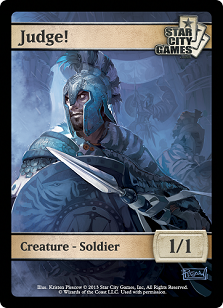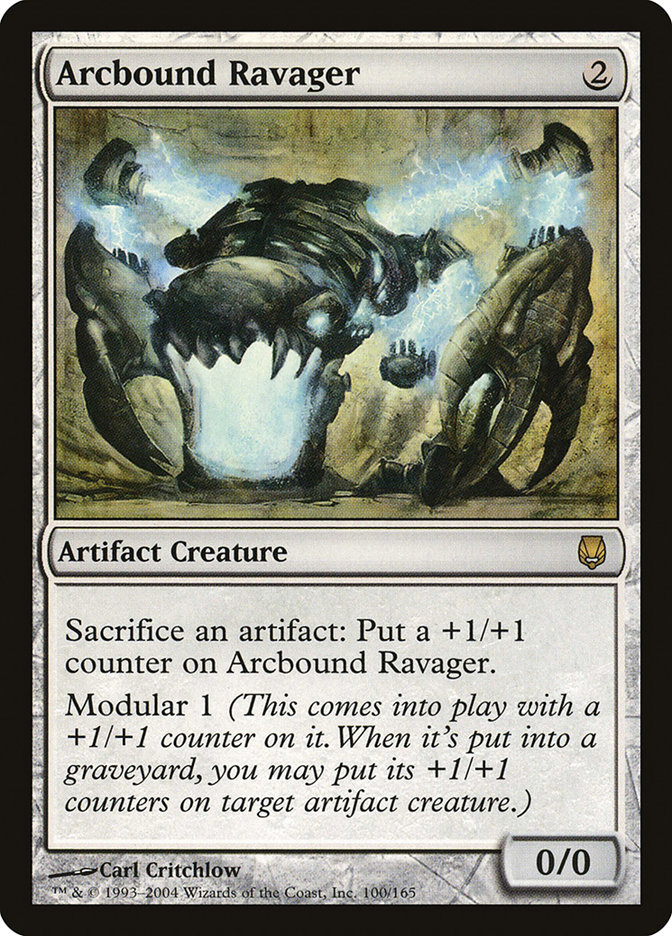
Without judges, Magic tournaments couldn’t exist in their current state. There would be nobody to make sure the rules are followed and nobody to solve problems that arise throughout the course of games. It’s important if you’re going to be attending Magic tournaments with any regularity that you understand the role of judges and what kind of assistance you’re able to ask for and expect from them when you need it.
There are three rules-enforcement levels in Magic tournaments: regular, competitive, and professional. Regular rules enforcement is supposed to be for tournaments that focus on fun and learning. However, when you enter a competitive- or professional-level event, be aware that the tournament is run with an expectation of a certain level of professionalism. It is not only you that should be held to that level of professionalism but your opponents as well. This article will focus on competitive- and professional-level events.
The most basic and common reason to call a judge is simply to ask a question. Whether you need to know about a trigger rule, a card interaction, or a tournament rule, that’s what judges are there for. They are trained to have a vast knowledge of rules and procedures. You are also able to get the oracle text on any card at any time. This is specifically useful if you are playing in a format with older cards that often play much differently than they read. For example, most creatures that were printed in older card sets have more or different creature types than are on the printed card.
Did you know this is a Beast?
Keep in mind that any time you call a judge you’re able to talk to them away from the table. Usually this is because you want to ask the judge a question about something that you don’t want to reveal to your opponent—for instance, a card in your own hand and how it interacts with the board. However, if for whatever reason you feel uncomfortable talking to a judge in front of your opponent or spectators, you can ask to speak to them away from the table for those reasons as well.
I notice that a lot of players are hesitant to call a judge even in situations where there is something they don’t understand. Players will often just ask their opponents to clarify the rules for them. Clearly there are multiple problems with this approach. First of all, your opponent often doesn’t have your best interest at heart in answering your questions. There is a possibility that they will even give you a vague or unclear answer or try to be intentionally misleading.
Secondly, if there is a situation you don’t understand, it’s quite possible that your opponent doesn’t understand it either. Even if they think they know the applicable rule, it’s possible they are incorrect in the current situation for one reason or another. You should never hesitate to call a judge to explain any situation you might find yourself in. Judges are at tournaments for a reason. They are there to help players, enforce the rules, and make sure things run smoothly. To this day, even if I am "pretty sure" about how the rules work in a given situation, I never hesitate to call a judge. There is no reason not to make absolutely certain you understand what is going on.
A few weeks ago Paul Rietzl made the following comment on Twitter:
we need to rid ourselves of the pervasive myth that calling a judge is a dick move.
— Paul Rietzl (@paulrietzl) November 5, 2013
This is a sentiment that I certainly agree with. I believe that people tend to think that calling a judge is an accusation of cheating and worry about offending their opponent. They also feel like a "jerk" if they call a judge on what they deem to be an honest mistake. I don’t see it that way. Even for honest mistakes there needs to be records, and sometimes there needs to be consequences.
Last week in the SCG Invitational I was playing a match against Death and Taxes. My opponent passed the turn. I thought for a few seconds about whether I wanted to play my Brainstorm on my opponent’s turn or wait until my turn. On my turn I Brainstormed and followed that up with Blood Moon. Of course, I had forgotten about the effect of my opponent’s Ethersworn Canonist. I had tapped an Ancient Tomb to play the Blood Moon, so my opponent ended up calling a judge I think primarily because he wanted to see if I’d still take two damage from my Ancient Tomb. If it had been a City of Traitors, I think he wouldn’t have called a judge at all.
The judge ruled that I would untap my lands and not take two damage and get a warning for a game rule violation. I fully expected this, and I deserved it. After the match my opponent asked me if I thought he was being unreasonable by calling a judge. I told him I faulted him not at all and that if the situation were reversed I would have definitely called a judge.
In Magic tournaments people make mistakes. Just as every player sometimes makes a play mistake, every player sometimes makes a procedural mistake. When a player does something that is against the rules, most often they did so by accident either because they didn’t know or understand the rule or forgot about an aspect of the game state that was different from normal.
If a player intentionally makes a game rule violation, this is cheating. If a judge realizes that a player intentionally broke the rules, they will be disqualified from the tournament. If a player does something like attack with a creature with summoning sickness, it’s caught immediately, and the judge believes that the player made an error, they receive a warning without any further penalty unless they have accrued too many warnings for game rule violations throughout the course of a tournament.
Just because you believe a player made an honest mistake and it’s easy to correct doesn’t mean you shouldn’t call a judge. There is a reason that you need to reach three game rule violations in a tournament before there is any tangible penalty. That’s because everyone understand that people make honest mistakes. There’s also a reason that once you make three or more game rule violations in a given tournament that there is a penalty. That’s because even if a player is making repeated honest mistakes these repeated mistakes have the possible consequence of compromising the integrity of the tournament.
Let’s take a theoretical situation where you are playing against a very sloppy player. Most players who fit this mold probably don’t understand that by being continually sloppy they eventually gain an unfair advantage against someone who doesn’t notice their mistakes. By having judges called on them, the player will very likely learn to pay better attention and not repeat those mistakes.
If you are an experienced player and find yourself wondering what to do in these situations, you should also keep in mind who ends up suffering if these mistakes go unnoticed. Usually, it won’t be you or your opponent. It will typically be a less experienced player who is less likely to notice the mistakes of your sloppy opponent when paired against them. Ultimately, the opponent will gain an unfair—albeit accidentally unfair—advantage.
Sometimes you will evaluate a situation incorrectly. You will believe something is an honest mistake, and it won’t be. There may even be potential for abuse that you haven’t thought of. It’s important to get these things on record in case you are wrong. If someone truly makes an honest mistake, it is very unlikely for it to negatively affect them at all, and you really should not feel bad about it or feel like a jerk for calling a judge.
Rarely something will happen in a game of Magic that is against the rules, and you won’t be sure if your opponent’s mistake was honest or if they were breaking a rule intentionally to try to gain an advantage. A good example would be when an opponent has been on top of their triggers throughout an entire match and suddenly inexplicably misses a trigger when it becomes a disadvantage to them.
For instance, in a long match in which an opponent hasn’t missed a single trigger from Dark Confidant despite having it in play all three games, it would look extremely suspicious to suddenly miss a trigger from it after going to one life. This is obviously a very extreme example. Imagine another hypothetical situation where your opponent has a 3/4 Cloudfin Raptor in play. Your opponent knows your hand contains a copy of Reprisal due to you being forced to reveal your hand a few turns earlier. Then inexplicably your opponent plays a 2/5 creature and forgets to evolve their Cloudfin Raptor.
Even in a situations like these you can never be absolutely sure your opponent hasn’t just made a very unfortunately timed mistake. In these situations you should certainly call a judge and make them aware of the situation. It is not necessary to accuse your opponent of cheating. Explaining all the facts to a judge is usually enough. Judges are trained to look for and investigate situations that have a high potential or likelihood for abuse.
Another area where I believe judges aren’t called enough is that of slow play. Some people play slower than others, and that’s generally okay. When it’s not okay is when it’s going to prevent the match from reaching its natural conclusion. This isn’t to say that whenever people are playing a slow deck or thinking at all you should call a judge. But this is another situation where if you are in doubt you should call a judge. Slow play rules exist for a reason just like everything else. By calling a judge, you aren’t accusing your opponent of stalling. In fact, you aren’t necessarily accusing them of anything.
When I call a judge because I am unsure about the pace of play, I will usually just ask the judge, "Would you mind watching this match for pace of play?" Sometimes the judge never says another word, indicating that the pace is fine, and that’s okay. I just wasn’t sure. Other times the judge will indicate they do feel that my opponent is playing too slowly. This doesn’t mean they are intentionally trying to gain an advantage; it just means that they aren’t keeping up with the pace required.
I have certainly been told that I need to make a play before because I was thinking too long, as have many other players. Like other judge calls, it is not something you should feel bad about. Magic is not a simple game. Some situations are exceptionally complex and require thought. There are still rules in place however for maintaining a reasonable pace.
Just remember that judges are at tournaments because they want to be there. They spend their time and in some cases money so that tournaments we attend are run smoothly and with as much integrity as possible. They aren’t there to "punish people" but are there to make sure everyone is on a fair and even playing field. They understand that not every player is as up to date on the rules as other players. They are there to help, and presumably they like helping or wouldn’t be there at all. Use judges the way they are intended: to solve rules problems and to answer rules questions. Rules are in place for a reason. If rules are broken, let judges decide how serious it is. And most importantly, never feel bad or feel like a jerk for calling a judge.


